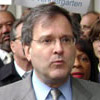
As Congress debated whether to approve the$700 billion bailout last week, politician after politician stood up to speak for "Main Street not Wall Street."
That sentiment played well in much of the country. But in New York, "Main Street" and "Wall Street" are inextricably linked. The city has at least three Main Streets and no doubt some of their residents have jobs on Wall Street or work for businesses patronized by the very investment backers and brokers so derided in the current rhetoric.
In 2007, workers in the finance industry accounted for more than a third of all the income earned in the city, double its share 30 years ago. A report by the state comptroller said the current economic problems could cause the state to lose 40,000 private sector jobs and $3 billion in tax revenues over the next two years.
The turmoil in the markets is viewed as having such dire consequence here that Michael Bloomberg said last week it justifies overturning city law to allow him to serve a third term (see related story). And Gov. David Paterson said he would call legislators back to Albany after the November election so they would make more budget cuts.
As the economic dominoes continue to fall, Gotham Gazette asked a number of experts what they see as the likely immediate and long-term effects of the economic crunch on key sectors of our economy -- and what they would suggest government do to help.
 |
Government: Carol Kellermann, President, Citizens Budget Commission |
 |
Labor: Ed Ott, Executive Director, New York City Central Labor Council |
 |
Wall Street: Charles Geisst, Professor, Manhattan College |
 |
Real Estate: Steve Spinola, Chair, Real Estate Board of New York |
 |
Real Estate: Noah Rosenblatt, Publisher, UrbanDigs.com |
 |
Small Business: Carl Hum, President and CEO of the Brooklyn Chamber of Commerce |
 |
Human Services: Michael Stoller, executive director, Human Services Council |
 |
Foundations: Steven Lawrence, Senior Director of Research, The Foundation Center |

Carol Kellermann
President, Citizens Budget Commission
1. What is the immediate impact on the city and state budget?
The direct consequences of the recent turmoil are likely to be revenue losses for the city and state governments. The loss of jobs and income will translate into lower income and sales tax collections, and property values in New York City will be adversely affected, causing losses in the local property tax. In addition, the reduced returns on investments for the public employee pension funds will require greater employer (read taxpayer) contributions to those funds in the coming years. In brief, we will face a budget squeeze in the short run.
New York City is better prepared for this squeeze than the State of New York. The city has a surplus from previous years that it can use for operating expenses this year and, to some extent, next year. The state is in worse condition, in part because without a property tax, it relies more on income tax receipts. Since the state government adopted the budget last spring, it already has had to make further cuts to reflect the economic realities; more may be necessary before its current fiscal year ends on March 31, 2009.
Both the city and state face large budget gaps for their 2009-'10 fiscal years. We will have a clearer picture of how large those gaps are when Mayor Michael Bloomberg releases his modified budget in November -- if not earlier -- and when the state releases its mid-year report later this month. In both cases, it is not likely to be a pretty picture.
2. What is the long-term impact?
In the long run, the key question is how the shake-up in financial services will affect the future of that industry in New York. The financial services sector and the professional business services, such as law and accounting, that are tied to financial transactions, are a critical part of the New York economy. The high paying jobs in these areas account for a disproportionately large share of tax revenues, and the spending by the people making these salaries creates jobs in local service industries such as restaurants and personal services. The financial sector and related fields also sustain high property values by creating demand for office space and housing.
Two types of longer-run developments could hurt the city, if they became realities. First, the financial services sector could contract and so become less important in the national and world economies. If financial service firms do not bounce back by once again creating new products of value to customers, then New York will suffer in the long run. We have a stake in the general health of the financial services industry.
Second, however large it might become on a global scale, the financial services industry could become more decentralized, with less activity concentrated in New York. New York faces competition for financial service jobs from London, Tokyo and other global centers; it also faces a threat as financial activities become more decentralized, with more regional centers around the globe taking on roles now performed at offices in New York and London. The future geographic distribution of this industry could change and that change could very well not be in New York's favor.
3. What should/can the state and city do to ensure stability?
The things that will keep New York competitive for high paying jobs are the things that make the city attractive to talented people. We need to be a place where the best and brightest want to be. That means being safe and having good schools, but it also means offering amenities like world-class cultural institutions and restaurants. It also requires being multi-cultural, welcoming a diverse population and valuing people for their talents.
Fortunately, New York now stacks up well on these critical competitive features, and short-run budget problems should not have long-run impacts on these great attributes. State and local policies should concentrate on protecting our strengths, but doing so in more efficient and innovative ways. One disadvantage of New York is high taxes, and this will continue to be an aspect of living or doing business in of New York. But we can mitigate the negatives of high taxes by making the most of what they buy. We should not lower taxes by cutting services; we should make sure we get the most out of our taxes in the form of valuable public services, delivered efficiently by a hard-working and well managed corps of public servants.
4. What is your biggest fear regarding the turmoil on Wall Street?
The failure of the initial rescue proposal in Congress revealed the biggest danger of recent events - the risk of a revival of hostility from people outside the city toward New York. The anger directed at "rich New Yorkers" and "Wall Street parasites" voiced by some in the American heartland could lead to national policies that could harm the city and ultimately the nation. Our fellow Americans need to be convinced that the city plays a vital and constructive role in the economy and that all of us are well served by a healthy New York economy.

Ed Ott
Executive Director, New York City Central Labor Council
1. What is the immediate impact on New York City labor and the average NYC worker?
We have seen tens of thousands of people lose their jobs in almost every sector. It's not just union jobs, but also executives walking out of their office buildings carrying cardboard boxes. Workers are fearful and stressed about losing their jobs and finding new ones, as well as about the diminishing returns and values of their retirement accounts and 401K plans, and the home foreclosure and credit crisis. In essence, workers are paying a very high price for a party to which they were never invited. Workers are the perpetual victims of an economic system that rewards the wealthiest and discounts working people.
2. What is the long-term impact?
Ripple effect is a better word for what is going to happen. Each job eliminated on Wall Street could cause two others to be lost elsewhere in the city, meaning the hurt will be felt everywhere from retail and restaurants to education and construction.
3. What should/can the state and city do to ensure stability?
The federal government has to do what is right first, and every national leader must be aware of the pain that working people are feeling. Passing the economic bailout plan with conditions is a start to putting the American economy back on track. The best thing the city and state can do is keep their economic development plans strong and viable. Spending must be closely examined. Every dime counts. Most importantly, our leaders must find ways to give the nation's working people -- the true creators of national wealth -- a real voice in the economy and our future.
4. What is your biggest fear regarding the turmoil on Wall Street?
Obviously, our biggest fear is that government and Wall Street will not take effective measures quickly enough and our city and nation could then enter into a deep recession or long depression that will include massive unemployment and devastating effects. This is a good time to remember that it was the everyday workers during the Great Depression who got our country back on its feet and re-established the strong character and productivity of our nation.

Charles Geisst
Professor of Finance, Manhattan College
1. What is the immediate impact on New York's role as a financial center?
The immediate impact on the Street is fewer investment banks, larger commercial bank-holding companies and less employment. The new, larger entities, especially the merged ones, will need fewer employers and will necessarily be cost conscious. Historically, this change is unprecedented because of its size.
2. What is the likely long-term impact?
The long-term impact is that Wall Street's portion of city output, employment and taxes collected will shrink. This has not happened since Great Depression.
3. What should/can the state and city do to ensure stability and protect New York's prominence in this area?
The city should try to diversify away slightly from the Street, perhaps encourage other service industries at expense of finance.
4. What is your biggest fear regarding the turmoil on Wall Street?
My greatest fear is a prolonged slump a la the depression of 1932-'39. This could happen if the securities sold by investment banks and other financial institutions do not recover despite federal assistance. It does not necessarily follow that just because Congress allocates $700 billion the securities will recover in the end and be sold for a profit.

Steve Spinola
Chair, Real Estate Board of New York
1. What is the turmoil on Wall Street's immediate impact on NYC real estate and development?
The immediate impact has been the near absence of credit for new development, renovation projects and normal business activity. The lack of credit will affect tenants moving into new space or upgrading existing space. There will be a similar impact on retailers who will face the added difficulty of maintaining an adequate inventory to operate successfully. Where credit is available, the amounts are generally small and more costly than in the past. The problem is affecting private sector real estate activity and will impact financing for public sector projects as well. In general, the turmoil has frozen a wide range of new business and real estate activity.
2. What is the long-term impact?
The current inactivity in lending cannot go on indefinitely. Banks and other financial institutions must lend to make money. The passage of the rescue bill in the Senate and in the House will provide a foundation upon which financial institutions can restore credit to the market and other businesses can plan their future. I think the presidential election will provide an additional element of stability that is unavoidably missing during a political campaign. These actions, we can hope, will provide the guidance and direction necessary for businesses to resume their regular activity.
3. What should/can the state and city do to ensure stability?
City and state leaders must continue to provide strong leadership and embody the determination and the confidence to solve these problems. Also, they must lead by example. Government must do more with less and should not look to raise taxes. Imposing such an economic burden on businesses and property owners who face these unprecedented challenges will only make recovery more difficult. Instead, government needs to provide the financial support necessary to those important projects that are vital to our city and our economy.
4. What is your biggest fear regarding the turmoil on Wall Street and how it could affect NYC real estate and development?
The most immediate concern is the effect that the loss of Wall Street bonuses will have on the housing market and municipal tax revenue. Another concern is that the turmoil is not quickly quelled, that businesses contract as a result and the demand for commercial space diminishes. This would impact the real estate market and the city as the reduction of activity would lower employment and tax revenue. Nevertheless, I am confident that we will address our problems promptly and that over the next six to nine months the market will rebound and we will be moving in a positive direction.

Noah Rosenblatt
Publisher, UrbanDigs.com
1. What is the immediate impact on NYC real estate and development?
The immediate impact will be seen in the confidence level on both sides of the transactions. On the sell side, it will make desperate or struggling sellers much more eager to lower their price or entertain a low-ball bid. On the buy side, I would expect more caution across the board. Some buyers will wait, some will price in the risk of downturn in their bids, some will consider walking away from their deposits, some will try to renegotiate done deals and some will simply put up a hard bargain due to the uncertainty.
In my opinion, it is all about the buyers, so when buyer confidence gets hits hard, you will see sales volume slow noticeably. That puts severe pressure on those sellers without a unique product who have to sell relatively quickly.
2. What is the long-term impact?
Longer term, we get into quality of life concerns, budget issues, survival of our local businesses, city tax collections without Wall Street's big revenues, etc., and a possible psychological shift on how the city in general is viewed as a place to live. This revolves around how this city will adjust from the aftereffects of a decimated Wall Street and the most severe credit crisis since the Great Depression. New York is a resilient city, so I am hoping we adapt to this challenging environment and come out of it somewhat unscathed.
3. What should/can the state and city do to ensure stability?
On a local level, it's very hard to say. We need to manage our budget wisely as we deal with this crisis. This is a Wall Street city facing a Wall Street Crisis. We don't need a math professor to do the equations here. Maintaining quality of life, social life, and survival of local businesses without affecting individual property taxes too much would be the ultimate goal. In terms of credit stability, I am afraid it is out of our local governments hands and up to the credit markets to get through this challenge.
4. What is your biggest fear regarding the turmoil on Wall Street?
My biggest fear is seeing a change in crime, cleanliness, drugs, homelessness, etc. to this great city. Everything that Rudy Giuliani did to clean this city up, I fear may be undone by this Wall Street centered crisis. The worst-case scenario for Manhattan is if crime increases and quality of life deteriorates as the local economy and individuals hurt from this deep slowdown. If the perception of Manhattan as a "great place to live" is psychologically altered, that combined with the negative macroeconomic forces can put downward pressure on real estate values for many years to come. This will likely not be a V shaped cycle, instead, it is more likely that any correction in real estate prices will resemble an L shape, with prices reverting back to their historic means where incomes and affordability get back in line.

Carl Hum
President, Brooklyn Chamber of Commerce
1. What is the immediate impact on the city's small businesses?
The financial downturn affects anyone who has a 401K, investments in mutual funds or even a savings account. As a result, people will be a lot more mindful about how they spend their money. This could mean a lot of different things for our small business community. The postponement of buying big-ticket or luxury items may affect some retailers while the increase in food purchases for at-home meal preparation could be a boost to others. For the most part, however, it is the access to credit that will affect most businesses.
2. What is the long-term impact?
The financial downturn has already affected many businesses' access to credit. With tightening credit lines and/or increased interest rates, simple things like paying your vendors within 60 days could become complicated. I believe the long-term effect is how businesses will approach credit. Some firms will need to revise plans for expanding their businesses or introducing new product lines depending on their access to credit.
3. What should/can the state and city do to ensure stability?
The federal government is in the best position to affect stability in the market. However, the city and state should do as much as possible to ensure that credit is available and that businesses are able to operate. This could include establishing a credit fund that could help small businesses meet expenses and keep their operations afloat while receivables come in, or having the city or state guarantee loans to small businesses.
4. What is your biggest fear regarding the turmoil on Wall Street?
The biggest fear is that we lose faith in our financial infrastructure. The market provides capital for our entrepreneurial class to invent, innovate and improve our lives. Without it, our progress as a society could be hampered.

Michael Stoller
Executive Director, Human Services Council
1. What is the immediate impact on the human services/nonprofit sector in New York City?
The immediate impact is similar to that in the general population: fear and anxiety about exactly how bad this is and how much worse it is going to get. Some smaller agencies have already closed their doors. Government funding is constricting.
2. What is the long-term impact?
The long-term impact, if things do not improve, is dire. Government funding will shrink radically, as will funding from philanthropic and corporate foundations and from (now less-wealthy) individuals. This will dramatically reduce the services nonprofit social service agencies can provide. At the same time, the need will be greater, as more people lose their jobs and fall through the frayed safety net.
3. What should/can the state and city do to ensure stability?
Imagine if the New York City social service sector got one seven-hundredth of the amount the federal government is spending to bail out the reckless Wall Street firms. One billion dollars would go a long way to care for the poor, the elderly, the kids, the immigrants, the mentally and physically ill -- in other words, our clientele.
The state and city need to look at progressive revenue-raising options and not just at service cuts. They need to streamline their procedures so contracts with social service providers are executed -- and paid for -- quickly and fairly, with sufficient funding for necessary administrative overhead. They need to include the social services sector in the decisions on which programs to cut and not just do an across-the-board percentage cut in all agencies. They need to work with HSC and others to advocate for our needs with the federal government.
4. What is your biggest fear regarding the turmoil on Wall Street?
My biggest fear is that the rich will be saved from the consequences of their recklessness and greed, and the poor will be screwed.

Steven Lawrence
Senior Director of Research, The Foundation Center
1. What is the immediate impact of the turmoil on Wall Street on the city's foundations and/or nonprofit sector?
We are unlikely to see much of an impact from the financial crisis on overall area foundation giving this year. Most of the larger endowed New York City foundations have professional asset managers and diversified portfolios, so it's unlikely that their assets will fare any worse that those of other investors. Some area foundations will also benefit from new gifts to foundations from donors and via bequests. In terms of giving, many foundations determine their grants budgets early in the year, so their 2008 giving is less likely to be affected by the current economic volatility. At the same time, area foundations that are directly tied to financial services firms, or that were heavily invested in those firms, may have to begin cutting back on giving this year.
2. What is the long-term impact?
A great deal of how foundations fare in New York City and nationally depends on how the market reacts to the financial sector bailout and to the results of the 2008 presidential election. But even if the economic situation remains bleak at year's end, the larger, endowed foundations will strive to maintain levels of giving that are as stable as possible. Some do this by determining their grants budgets each year based on an average of their asset values over the preceding two to five years, thus mediating the impact of the bad years with the good.
Nonetheless, the vast majority of area foundations are "family foundations," with support coming from individual donors or donor families. Given the disproportionate role of the financial sector in generating New York City's wealth, any downturn in the that sector will likely have a disproportionate impact on smaller area foundations, which also tend to be local funders.
3. What should/can the state and city do to ensure stability?
[[NO ANSWER]]
4. What is your biggest fear regarding the turmoil on Wall Street?
Because foundations can hold charitable endowments, their giving overall tends to be less affected by economic downturns than corporations and individuals. But they certainly are not immune to economic cycles. The biggest impact of an extended downturn would be that foundations may need to focus more on providing core support for long-time grantees and programs and have fewer resources to support new organizations and projects.
Â




